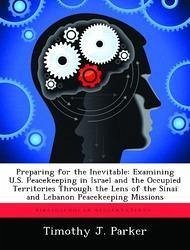Many lessons from the Multinational Force and Observer (MFO) mission to the Sinai and the Multinational Force II (MNFII) mission to Lebanon are relevant for future U.S. peacekeeping operations in Israel and the Occupied Territories (OT). A final peace between Israel and the Palestinians is a critical U.S. national interest and is unlikely to occur without a US-led international peacekeeping force. It is important that the U.S. begin to consider the strategic and operation requirements for this mission. Strategic conditions that assisted the success of the MFO and challenged the MNFII must be considered before US involvement in Israel and the OT. The commitment to the treaty of two viable parties, the reduction of external destabilizing influences, and the resolved leadership of the US are the three essential strategic conditions needed. The operational environment of Israel and the OT more closely resembles that of 1982 Lebanon, with its urban and populated countryside, ethnic, religious, and political factions, and militias, terror organizations, and pronounced foreign influence. The Sinai, on the other hand, presented a much larger area, with few urban areas, sparse population, and no internal divisions. Despite the differing operational environments, the MFO and MNFII still provide relevant operational lessons for Israel and the OT. Critical operational lessons are: the necessity of a clear and achievable mission, selecting an effective organization structure for the force, the importance of a unified and compact command structure, tailoring the force for the specific environment and assigned mission, the need for the force to be able to adapt to changes in the situation, and the benefit of maintaining impartiality in the conduct of the mission.
Hinweis: Dieser Artikel kann nur an eine deutsche Lieferadresse ausgeliefert werden.
Hinweis: Dieser Artikel kann nur an eine deutsche Lieferadresse ausgeliefert werden.








